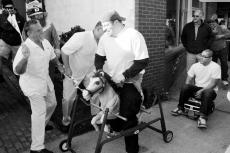With the passage of new property maintenance rules on Friday, East Hampton Village landowners will now have to pay extra attention to litter, tree and shrub trimmings, stagnant water, and weeds that extend beyond their property lines.
The new rules will require that these be removed. Property owners will also need to clean up debris, paper, dirt, garbage, and junk, and make sure all structures including fences and retaining walls are kept up. Those with street-front parcels will have to keep hedges, trees, shrubs, and grass trimmed so that they don't extend beyond property lines. Landowners will have to keep water emanating from rain pipes from flowing onto the sidewalk of an adjoining parcel, and they will be prohibited from storing unregistered vehicles including automobiles, trucks, trailers, and boats outdoors.
The owners of multifamily and commercial properties will be required to keep the grounds free of insects, rodents, and vermin, driveways and parking spaces in "good repair" and regularly cleaned, and walkways cleared of obstructions including snow and ice. People will not be allowed to deposit snow or ice onto the street. If a building inspector or code enforcement officer finds that a violation creates a public health or safety hazard, the owner may be required to immediately rectify the issue. The law will go into effect in a few weeks after it is filed with New York's Secretary of State.
Violations will result in a $100 to $200 fine for the first offense, and a $150 to $250 fine for subsequent offenses within a year. Those cited for a violation will be allowed 10 days to submit a written request for a hearing with the building inspector, who may withdraw the citation if he finds that no violation exists or that the requirement has posed an undue hardship due to the size of the property.
"This will help us make people be good neighbors," said Mayor Jerry Larsen. The regulations were approved in a unanimous vote.
Also on Friday, the board held a public hearing on a proposal that would allow cellars to extend beyond the exterior wall of a residence.
The proposed cellar code would roll back a prohibition enacted in 2015. It would allow a cellar to exceed the first floor's ground floor area by up to 25 percent, and it would increase the maximum permitted depth from 12 to 15 feet. The expansion would have to remain within the same setbacks as required for the primary structure, and would count toward that parcel's lot coverage allowance. A separate proposal would allow a window well, which could provide egress from a cellar, to extend eight feet from the wall of the structure's foundation.
The proposals, along with the property maintenance one, were scheduled for public hearings at a Sept. 17 meeting. There was no public discussion among board members at the time, and Rose Brown and Arthur Graham, trustees, asked Mr. Larsen to postpone the hearings to give residents a chance to grasp the details. "We're missing the opportunity to get public input if we're bringing up a resolution for the first time at a public hearing," said Ms. Brown. "The open meetings law was set up so people could watch their governing bodies making the sausage as they say, and I think we ought to do that," added Mr. Graham.
During a public hearing for the cellars proposal on Friday, Maureen Bluedorn said permitting an expansion of cellars would encourage homeowners to create more living spaces, which could lead to an increase in population density. The village doesn't have enough parking spaces to accommodate more residents, she said, and the problems caused by outdated septic systems would be exacerbated by increased density. In August, the board passed several other new zoning laws, including one that permits the development of two-bedroom accessory dwellings on properties of 60,000 square feet or more. "I have been most concerned recently with the speed with which we're enacting zoning changes," said Ms. Bluedorn. "I'm afraid that we will be slowly but surely overwhelmed with these changes."
Andrew Goldstein said counting the cellar extension as part of lot coverage was at odds with the code's definition of lot coverage, and suggested removing the provision. "It's almost punitive, especially on small lots," he said.
David Ganz took issue with the "lack of transparency" in the way the board conducts its business. Decisions appear to be made prior to board meetings, and the meetings themselves are simply a "fait accompli forum," he said. "This does not allow the citizens to . . . listen to the deliberations and decisions that go into the making of public policy," he said.
Echoing Ms. Bluedorn's concern, Mr. Graham said increasing the size of cellars could indeed lead to an increase in population density if homeowners use the space for additional bedrooms. He noted that allowing window wells to be constructed eight feet from the wall of the house could create unsightly vistas, with the structures emerging from the middle of front lawns. He asked why the permitted depth of basements was increased to 15 feet, and Vincent Messina, the village attorney, said that he, Billy Hajek, the village planner, and Tom Preiato, the building inspector, had arrived at that number. "We were trying to come up with something reasonable . . . and that would provide enough flexibility to do any number of things," he said.
After Mr. Graham pointed out that the text of the proposed cellar code needed to be rewritten for clarity, the board decided to adjourn the vote on it and the window well proposal until the board's Nov. 4 meeting.
The board did approve a proposal to establish the position of village constable or peace officer, a part-time law enforcement role that can be filled by candidates who complete a training program or who have previously worked as police or peace officers within up to 10 years. The duties will include assisting with car accidents and other emergency situations, investigating reports of code violations and law breaking, and directing pedestrian and vehicle traffic. They will be allowed to carry a firearm after having successfully completed training.



